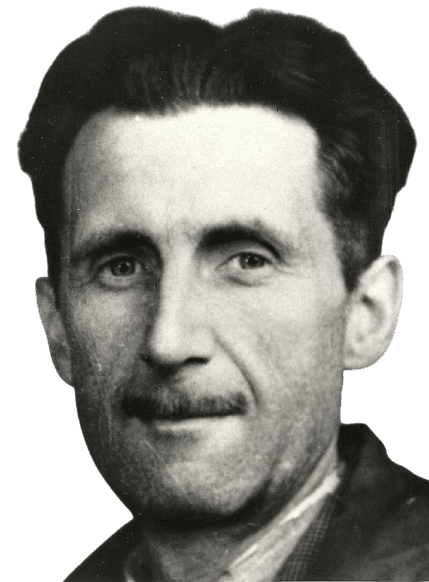Life and achievements
Early life
George Orwell, whose real name was Eric Arthur Blair, was born on June 25, 1903, in Motihari, India. Eric's father, Richard Walmesley Blair, was a clerk in the Opium Department of the Indian Civil Service. However, his mother, Ida Mabel Blair, Eric, and his sister returned to England in 1904. Orwell's parents separated, and his mother, with two sisters, took him to Henley-on-Thames in Oxfordshire, where Orwell was brought up.
Orwell entered St. Cyprian's School in Eastbourne and got a scholarship at Wellington and Eton colleges. However, being a lower-middle-class man, Orwell was less confident than he had to be in these institutions. Significantly. Cyprian's schools significantly influenced his essay "Such, Such Were the Joys," which attacked the British boarding school system.
Orwell left Eton and went to Burma, where he joined the Indian Imperial Police. His time in Burma is portrayed in his novel "Burmese Days" and essays such as "A Hanging" and "Shooting an Elephant." He became frustrated with imperial service and left Burma in 1927, returning to England to become a writer.
Orwell's first occupation as a writer was in journalism. He was relatively poor during this period, as depicted in his book "Down and Out in Paris and London." This period also saw him develop his political consciousness and concern for low-income people. He selected the pen name George Orwell, taken from the River Orwell located in Suffolk, so that he would not disgrace his family by having a writer in the family.
Legacy
Orwell's work has left a significant influence on the literary world and society, and even today, his works still affect people. Orwell's ideas on dictatorial governments and authoritarian states, including "Animal Farm" and "Nineteen Eighty-Four," cannot be overemphasized in any discussion concerning surveillance, censorship, and individual freedom. The term 'Orwellian' is used to depict oppressive and authoritarian actions, thus underlining the relevance of his vision.
The social justice, poverty, and class inequality described by Orwell in "The Road to Wigan Pier" are topical today and continue to discuss economic inequality and social justice. His commitment to democratic socialism and his rejection of fascism and Stalinism are proof of his keen understanding of various political structures and their effects on people's liberty.
Orwell's impact continues after his writings. His essays, reviews, and journalistic works present an acute perspective on various aspects of culture and politics and influenced the literary style and journalism with his crusade for plain language.
In addition to his literary works, Orwell's biography, including his participation in the Spanish Civil War, work at the BBC, and health issues, contributes to his personality. He remained honest and passionate about the truth, inspiring many writers and philosophers of subsequent generations.
George Orwell's work is still widely known, and his novels are translated into many languages. Stage, screen, and television adaptations of his works make it possible for future generations to see the message he wanted to pass on. His fears about totalitarianism and the loss of the concept of truth are very relevant today, considering the problems of privacy, fake news, and authoritarianism.
Milestone moments
Jan 16, 1933
Release of the book titled "Down and Out in Paris and London."
Orwell's first book, "Down and Out in Paris and London," was published in January 1933. The book depicts his suffering in both cities, thus clearly painting a picture of the living conditions of the homeless and working-class individuals.
Critics applauded this work, and it paved the way for Orwell to be recognized as a writer who could depict the conditions of society and its vices and was a good writer.
This success led to Orwell's writing, journalism, and publishing career.
Aug 16, 1936
The Beginning of the Spanish Civil War
Orwell left for Spain in August 1936 to fight in the Spanish Civil War on the Republican Army's side. He joined the POUM militia and fought on the Aragon front, where he was injured.
These experiences in Spain were significant for Orwell and shaped his political views and opposition to totalitarianism.
This period of his life is depicted in the book "Homage to Catalonia," which is an autobiographical and political narration of the events that took place and is regarded as one of his finest works.
Aug 16, 1945
Publication of "Animal Farm"
Animal Farm, published in August 1945, became a bestseller. Using a farm and its animals, this novella is an allegory of the Soviet Union's deviation from socialism and the Russian Revolution.
The novel "Animal Farm" became a huge success, and Orwell became a well-paid writer on political affairs.
Jun 16, 1949
Publication of "Nineteen Eighty-Four"
Orwell's novel "Nineteen Eighty-Four," published in June 1949, portrays a bleak future in which the state rules the citizens.
The novel Nineteen Eighty-Four introduced terms such as Big Brother, thought police, and Newspeak into "ciety. The book Provo" ed the reader's significantly impacted readers, proving Orwell was a great and prophetic writer.
